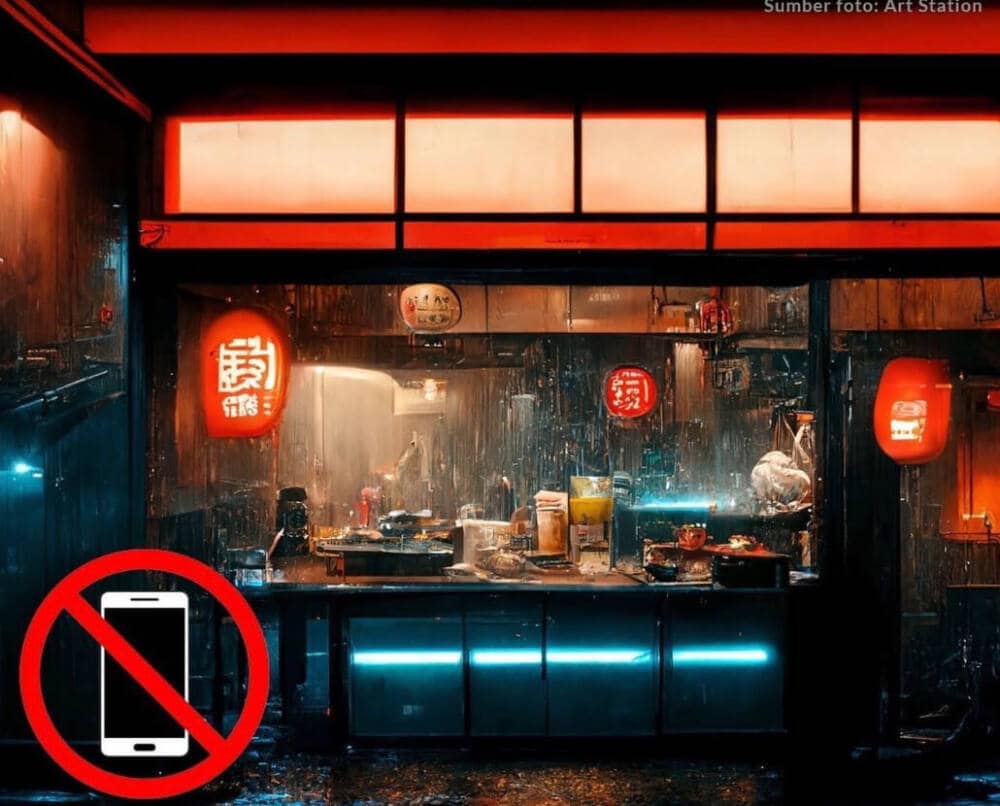In the vibrant Takadanobaba area, renowned for its fierce competition among ramen establishments due to the high density of students from nearby educational institutions, a particular ramen shop has taken a stand on dining etiquette.
At Debu-chan, a newly implemented policy is reshaping the dining experience: patrons are now asked not to watch videos on their mobile devices while eating.

This edict is rooted in the sentiments of the shop’s owner, Kota Kai, who finds it disheartening that the ramen, which he crafts with great care, often goes unappreciated as customers divert their attention to their phones, leading to a decline in the quality of the meal as the noodles become soggy.
Moreover, the policy supports a more efficient turnover of the restaurant’s limited seating, alleviating the wait times for those queued outside.

Debu-chan, which is recognized for its Hakata-style tonkotsu ramen, is fostering a dining culture that values attentiveness to food and culinary craft.
While the restaurant maintains respect for personal enjoyment, it also reflects broader Japanese values that prioritize efficiency and consideration for others patiently waiting for a table, especially during peak dining hours.
This unique stance by Debu-chan has prompted varied reactions. Some individuals embrace the regulation, citing it as a reflection of good upbringing and proper public decorum.
Others contest the restriction as overbearing, preferring to dine without the weight of the restaurant’s ethos influencing their meal experience.
The opinion that use of mobile devices should be limited to non-intrusive activities, akin to watching the restaurant’s TV, also surfaces.
Your Experience With the Policy:
- Visual engagement with meals is encouraged; photography of your food before eating is acceptable.
- Reading materials and entertainment options provided by Debu-chan, such as television, continue to be accessible.
- To absorb the full culinary experience, explore other local ramen spots if video watching while dining is integral to your enjoyment.
In conclusion, the dining ethos at Debu-chan beckons you to a deeper appreciation of the meal in front of you. While personal leisure and relaxation are understood, the essence of the policy is respect for the chef’s craft and the dining experience as a whole. Familiarize yourself with this philosophy to ensure a harmonious visit to this esteemed ramen spot.
What caused the ramen eatery in Tokyo to introduce a restriction on phone use?
The owner of the Tokyo ramen restaurant, known as Debu-chan, implemented a phone ban to enhance the dining atmosphere and encourage patrons to focus on their meal rather than be distracted by their devices.
The decision was made after observing that many customers were paying more attention to their phones than their food, particularly watching videos which disrupted the traditional dining experience.
What has been the diner response to the new phone usage rule?
Reactions have been mixed, with some diners appreciating the opportunity to disconnect and enjoy their meal without distractions, while others feel inconvenienced by not being able to use their phones as they please during their meal.
Are other dining establishments in Tokyo following suit with phone restrictions?
While a few other restaurants have considered similar policies to maintain a certain dining etiquette, this practice is not widely adopted in Tokyo. Most establishments still allow customers to use their smartphones freely.
What cultural effects does forbidding video watching in a ramen shop signify?
This policy touches on the deep-seated Japanese cultural value of mindfulness and respect within shared spaces. By banning video watching, the restaurant promotes a focused appreciation of the food and respects the shared dining environment.
In what ways does limiting phone use alter the meal experience at this restaurant?
The prohibition on mobile phone usage aims to steer the dining experience back to traditional values, where the act of eating is an experience to savor entirely, rather than the multitasking norm that smartphones can encourage.
Are there any allowed uses of phones in this Tokyo ramen shop?
Yes, the establishment does permit phone usage for purposes such as taking photos of the meal, but watching videos or engaging in phone activities that might disturb others or detract from the dining experience is discouraged.
My writing focuses on the various aspects of Japanese lifestyle, from traditional tea ceremonies and flower arrangement to modern fashion trends and pop culture. Through my articles, I aim to share my passion for Japan and provide readers with a glimpse into the rich and diverse world of Japanese culture.
I believe that the key to understanding Japanese lifestyle is to appreciate the balance between tradition and innovation. While Japan has a rich cultural heritage that dates back centuries, it is also a country that is constantly evolving and embracing new ideas and technologies.
Whether you’re interested in learning about the latest fashion trends in Tokyo, or want to explore the ancient art of calligraphy, my writing will take you on a journey through the many facets of Japanese lifestyle. So join me as we explore the beauty and complexity of this fascinating culture together!





